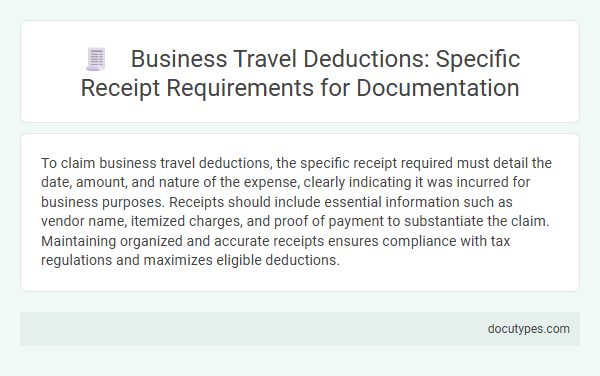To claim business travel deductions, the specific receipt required must detail the date, amount, and nature of the expense, clearly indicating it was incurred for business purposes. Receipts should include essential information such as vendor name, itemized charges, and proof of payment to substantiate the claim. Maintaining organized and accurate receipts ensures compliance with tax regulations and maximizes eligible deductions.
Understanding Business Travel Deduction Eligibility
Claiming business travel deductions requires proper documentation to substantiate expenses and eligibility. The specific receipt needed must clearly reflect the business nature and details of the travel expenditure.
- Itemized Receipt - The receipt must show a detailed breakdown of expenses such as lodging, transportation, and meals to verify the costs incurred.
- Business Purpose Documentation - Supporting documents or notes identifying the business purpose of the trip are necessary alongside the receipt.
- Date and Location Details - The receipt should include the date and location to confirm the travel aligns with the claimed business activities on those specific days.
Essential Receipt Details for IRS Compliance
What specific receipt is required for claiming business travel deductions? The IRS mandates detailed receipts that clearly show the date, location, and amount spent during your trip. Essential receipt details include the vendor's name, the business purpose, and itemized expenses to ensure compliance.
Types of Expenses Requiring Receipts
To claim business travel deductions, specific receipts are essential for validating your expenses. The IRS requires detailed documentation for transportation, lodging, and meal costs incurred during business trips.
Receipts must clearly show the date, amount, and vendor to qualify for deductions. Expenses such as airfare, hotel stays, car rentals, and client meals all demand proper receipts to support your tax claims.
Minimum Receipt Amount Thresholds
To claim business travel deductions, you must provide specific receipts that meet certain minimum amount thresholds. Your documentation should clearly support the expenses to ensure compliance with tax regulations.
- Receipts over $75 are required - Any individual business travel expense exceeding $75 must be supported with a detailed receipt.
- Smaller expenses may not require receipts - Expenses under $75 may be exempt from receipt submission but should still be recorded accurately.
- Itemized receipts are necessary - Receipts must include the date, amount, and description of the goods or services purchased for verification.
Electronic vs. Paper Receipts: Accepted Formats
Receipts required for claiming business travel deductions must clearly show the date, amount, and business purpose of the expense. Both electronic and paper receipts are acceptable as proof for the IRS, provided they contain this essential information.
Electronic receipts can include emails, PDFs, or images stored on mobile devices or cloud services. Paper receipts are physical copies such as printed invoices or handwritten receipts. You should maintain organized records of these formats to ensure compliance and facilitate smooth tax filing.
Required Information on Travel Receipts
For claiming business travel deductions, the receipt must include specific information to validate the expense. Essential details on travel receipts include the date of travel, the place of departure and destination, and the amount paid for transportation or accommodations. You should ensure the receipt also shows the payee's name and a clear description of the services or goods purchased to meet IRS requirements.
Special Rules for Lodging and Meals Documentation
Claiming business travel deductions requires specific receipts to verify expenses. Special rules apply to lodging and meals documentation to meet IRS standards.
- Lodging Receipts - Must include the name and location of the establishment, dates of stay, and amount paid.
- Meals Documentation - Requires a detailed receipt showing the date, place, and cost of the meal.
- Substantiation Requirements - You must keep these receipts to prove expenses are ordinary, necessary, and directly related to business travel.
Accurate and compliant receipts ensure your business travel deductions withstand IRS scrutiny.
Handling Lost or Incomplete Receipts
| Receipt Type | Detailed receipt showing date, vendor, amount, and purpose of the business travel expense |
|---|---|
| Required Details | Date of travel, business location, description of expense, cost breakdown, and method of payment |
| Common Acceptable Receipts | Hotel invoices, airline tickets, car rental agreements, restaurant bills, and transportation receipts |
| Handling Lost Receipts | Maintain a written statement describing the expense, date, and reason the original receipt is unavailable; reconstruct details using credit card statements or bank records |
| Handling Incomplete Receipts | Supplement with additional documentation such as calendar entries, meeting agendas, or travel itineraries that validate the business purpose and expense amount |
| IRS Guidelines | Receipts must substantiate the amount, time, place, and business purpose to qualify for travel deductions |
| Record Keeping Tips | Organize receipts digitally or physically, noting business purpose and date immediately after the expense occurs to prevent loss or incompleteness |
Recordkeeping Best Practices for Business Travel
Receipts required for claiming business travel deductions must include the date, location, and detailed description of the expenses. These documents serve as proof to support your travel costs such as transportation, lodging, and meals.
Maintain organized records by storing original receipts or clear digital copies in a dedicated folder. Consistent recordkeeping ensures accuracy and simplifies the deduction process during tax filing.
What Specific Receipt Is Required for Claiming Business Travel Deductions? Infographic

